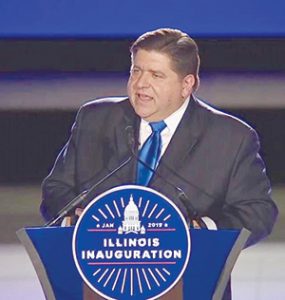
By CARL GREEN
Illinois Correspondent
Springfield, IL – On his first day in office, Jan. 14, Illinois Governor J.B. Pritzker issued orders and signed bills designed to help workers, including a bill to strengthen the prevailing wage system.
“Governor Pritzker did more on his first day for women and working families than the previous governor did in four years,” said James Thompson of the Southwestern Illinois Central Labor Council.
Some of the key items include:
• Prevailing Wage – Pritzker signed Senate Bill 203, an overhaul of the prevailing wage system designed to strengthen it and to make sure government agencies actually carry out its requirements.
• Project Labor Agreements – The governor signed an executive order allowing for Project Labor Agreements on all state public works projects.
• Included in that order was a component to combat equal pay disparity by prohibiting the state from requesting salary history for job applicants.
• Accountability – Another order calls for more accountability among state departments in providing data to show how well they are doing their jobs.
• Wage theft – Pritzker ordered the Department of Labor to “expeditiously” deal with cases of wage theft and day-labor exploitations, including referrals to the Attorney General.
• Step increases – Pritzker initiated a process to restore state employees to their previously negotiated pay levels after former Governor Bruce Rauner refused to honor their contractual step increases.
Major Labor issues remain to be addressed, but Labor supporters were delighted to see the Governor taking substantive actions so soon.
“I think he’s a man of his word, and I think he gets things done, said Council member Marcia Campbell, a longtime leader in the Illinois Federation of Teachers. “Will we get everything we want? Probably not.”
Ed Caumiant, AFSCME regional director and a Council member, said he was impressed with Pritzker’s swearing-in speech.
“His address could not have been better,” Caumiant said. “He said the right things. He said them the right way. He didn’t make apologies for standing with us. He talked about the progressive income tax, and that’s our future.”
PREVAILING WAGE
In one of his first acts as governor, Pritzker signed SB 203, a bill updating Illinois’ Prevailing Wage law that was passed in the previous Legislature, but which Rauner refused to sign. Prevailing wage laws ensure public sector construction jobs are bid based on equipment, materials and overall project management, rather than on the wages of the employees by requires construction workers to be paid state-set minimum wages on taxpayer-funded projects.
Under Rauner, the Department of Labor (DOL) had given little or no support to enforcement and delayed its required publication of prevailing wage levels.
The sweeping new law is aimed at closing loopholes that allowed local projects to shortchange or bypass the system’s requirements. Among the new provisions, which takes effect June 1:
• Sets the prev ailing wage rate at the collective bargaining rate for that craft.
ailing wage rate at the collective bargaining rate for that craft.
• Requires the DOL to create an electronic database for payrolls no later than April 1, 2020 Giving the Department another year to complete an electronic database of certified payrolls to use in determining the prevailing wage.
• Requires the DOL to determine the prevailing wage rates for each county in the state and to publish the prevailing wage schedule on its website no later than July 15 of each year.
• Requires the DOL to report annually on the number of people working on public works projects in the state, how many hours they are working and where the work is being done.
• Requires DOL to report on female and minority workers’ inclusion on public works projects, with recommendations on how to increase their participation.
• Establishes a detailed system for determining prevailing wages when at least 30 percent of workers on a project are covered by collective bargaining agreements, stating how to proceed when the level is below 30 percent, and affirming that public bodies may not opt out of the system.
PROJECT LABOR AGREEMENTS
The order affecting Project Labor Agreements (PLAs) is called, “Executive Order Strengthening Working Families.” PLAs require contractors to pay union wages and abide by collective bargaining agreements for public works projects.
The introduction to the order states, in part:
“A project labor agreement, a pre-hire collective bargaining agreement covering all terms and conditions of employment on a specific project, can ensure that public works projects proceed with the highest standards of quality and efficiency at the lowest responsible cost.
“Project labor agreements provide for peaceful, orderly and mutually binding procedures for resolving labor issues without labor disruption, which historically has resulted in significant lost time on construction projects.”
While Rauner had sought to discourage use of the agreements, Pritzker’s order says all state agencies must immediately comply with the Project Labor Agreements Law, and that the DOL will review all pending cases under the Wage Payment and Collection Act, the Minimum Wage Law and the Day and Temporary Labor Services Act and refer egregious and repeated violations of the Wage Payment and Collection Act to the Attorney General for civil prosecution.
STEP PAY INCREASES
Pritzker also committed to pay state workers their previously negotiated, longevity-based step pay increases – something Rauner refused to do for four years, even under court order.
Rauner moved to block payment of the increases upon taking, and state workers had campaigned to have the raises restored with back pay and interest.
Rauner’s attempt to avoid paying the increases may cost the state more than if he had paid the workers what they were owed in the first place.
 On his first day, Pritzker held a news conference on his first day to say he was unfreezing the salaries of the about 20,000 workers by reinstating the increases. He did not address the back-pay issue, but his spokesman, Jordan Abudayyeh, said it would be discussed in upcoming talks to replace the now-expired AFSCME contract.
On his first day, Pritzker held a news conference on his first day to say he was unfreezing the salaries of the about 20,000 workers by reinstating the increases. He did not address the back-pay issue, but his spokesman, Jordan Abudayyeh, said it would be discussed in upcoming talks to replace the now-expired AFSCME contract.
“With multiple unions representing workers across many agencies, it will take several weeks to provide an accurate picture of both cost and timing of the restoration,” Abudayeh said. “However, the Governor firmly believes that workers who have served the state without step increases should be brought to their current step level as expeditiously as possible.”
State Senator Andy Manar (D-Bunker Hill) noted that his district running north from the Metro East includes thousands of state employees.
“By far, the No. 1 constituent question my office continues to receive is when will state employees see back pay and promised step advancement restored,” Manar said.
“I appreciate that the governor has made this a priority and that he intends to move ahead in a manner that is responsible to the taxpayers of this state. I also hope this bodes well for inking a new contract agreement with state employees.”
OTHER KEY ISSUES
In his inauguration speech, Pritzker mentioned several other key issues for the early days of his administration, including:
• Passing a balanced budget.
• Raising the minimum wage.
• Moving toward a progressive income tax.
“The future of Illinois depends on the passage of a fair income tax, which will bring us into the 21st century, like most of our Midwestern neighbors, and the vast majority of the United States,” Pritzker said.
He also outlined plans to spend more on child care, adopt a climate change strategy and fight gun violence.
“But be clear about this: I won’t balance the budget on the backs of the starving, the sick and the suffering,” Pritzker said. “I won’t hollow out the functions of government to achieve an ideological agenda. I won’t make government the enemy and government employees the scapegoats.”

